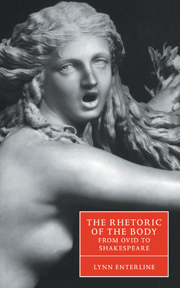Book contents
- Frontmatter
- Contents
- Acknowledgements
- 1 Pursuing Daphne
- 2 Medusa's mouth: body and voice in the Metamorphoses
- 3 Embodied voices: autobiography and fetishism in the Rime Sparse
- 4 “Be not obsceane though wanton”: Marston's Metamorphosis of Pigmalions Image
- 5 “Poor instruments” and unspeakable events in The Rape of Lucrece
- 6 “Your speak a language that I understand not”: the rhetoric of animation in The Winter's Tale
- Notes
- Index
- Cambridge Studies in Renaissance Literature and Culture
4 - “Be not obsceane though wanton”: Marston's Metamorphosis of Pigmalions Image
Published online by Cambridge University Press: 22 September 2009
- Frontmatter
- Contents
- Acknowledgements
- 1 Pursuing Daphne
- 2 Medusa's mouth: body and voice in the Metamorphoses
- 3 Embodied voices: autobiography and fetishism in the Rime Sparse
- 4 “Be not obsceane though wanton”: Marston's Metamorphosis of Pigmalions Image
- 5 “Poor instruments” and unspeakable events in The Rape of Lucrece
- 6 “Your speak a language that I understand not”: the rhetoric of animation in The Winter's Tale
- Notes
- Index
- Cambridge Studies in Renaissance Literature and Culture
Summary
In tracing the nature and effects of Ovid's phonographic imaginary, we have seen that tropes for the voice – both male and female – shape the representation of subjectivity in both the Metamorphoses and Petrarch's autobiographical revision of that poem in the Rime Sparse. At the same time, these tropes play a crucial role in each poem's fiercely unresolved struggle over what human bodies mean and what their differences signify. We've also seen that various figures of vocal self-dispossession – Philomela's tongue, Echo's repetitive uox, Medusa's mouth, Actaeon's lips, Diana's prohibition, Bacchic noise – darken the dream that both poets entertain, in their different ways, of an Orphic voice powerful enough to bring about the changes of which it speaks. Such figures betray a profound anxiety about the voice's limitations as an index of authorial subjectivity as well as its unpredictable relationship to both mind and world. Most important of all, the violent narratives of desire and dismemberment within which these figures for lost voices emerge warn us that we cannot separate the contradictions haunting this phonographic imaginary from the way each poem grapples with the question of the sexualized body's significance and value.
Ovid's culturally laden fantasies and anxieties about embodied voices are no less foundational to John Marston's The Metamorphosis of Pigmalions Image, one of the most biting satires in the tradition that Ovid inspired.
- Type
- Chapter
- Information
- The Rhetoric of the Body from Ovid to Shakespeare , pp. 125 - 151Publisher: Cambridge University PressPrint publication year: 2000

